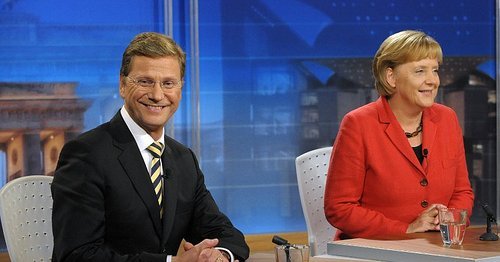The thorny question of this election was whether the SPD would attain enough support to maintain its coalition with the CDU, especially since Merkel voiced her preference a priori in this respect. Merkel was quoted to have said that she preferred to form a coalition government with the pro-business, liberal party-FDP so as to push through economic reforms.
The former coalition between Merkel’s CDU and Frank-Walter Steinmeier’s SPD has been termed by some critics as ‘an awkward grand coalition’. For Merkel the coalition certainly meant having to come to terms with more left-leaning measures like minimum wage in some sectors and a huge fiscal stimulus, whilst pushing aside some of her planned free market reforms. Many had envisaged a collapse of this coalition, but Merkel managed to hold it together and then take the credit for Germany’s recovery from recession and the deal that kept Opel a going concern. Some party supporters accused Merkel of becoming more leftist, whilst others approved of her pragmatism.
In this election, Merkel’s main rival was the leader of SPD. In a recent TV debate with Mrs. Merkel, Mr. Steinmeier said his party stood for more social justice and an end to nuclear power. Contrary to Merkel he also favours Turkish entry into the European Union, but then shares her views on keeping German troops in Afghanistan for the present and confronting Iran over its nuclear programme and negotiating binding goals to tackle climate change. All in all, analysts suggested that policy-wise there is little significant difference between the two, such that this debate was described as more of a duet that a duel!
There were several key campaign issues in this election; healthcare, education and jobs were amongst them. The issue on jobs was especially raised as recent figures suggest nearly 3.5 million unemployed people in Germany. In his campaign, Mr. Steinmeier vowed to bring full employment by creating four million jobs by 2020. On the other hand, Merkel said her party was the one “fighting for the German jobs of the future”.
Small parties also had their share in this election. Some even managed to hit headlines, such as the NPD and its ‘race hate’ letters to politicians from immigrant backgrounds. Of the millions of Germans that were eligible to vote, about one in 10 had an immigrant background, mostly being Turks or from the former Soviet Union. The Pirates contested the election as well; a small party which focuses on privacy policies, maintaining a free internet and opposing university fees.
The results that emerged from this election were the following: CDU/CSU - 33.4%, FDP - 14.8%, SPD – 22.7%, Left - 12.5%, Greens - 10.6% and others 6%. This has led Mr. Steinmeier to call the 27th of September a "bitter day for German Social Democracy“ as the SPD scored its worst result in modern history and moves into opposition for the first time in 11 years. The FDP leader, Guido Westerwelle, whom some are tipping as the next foreign minister, said the new government would act “responsibly” and claimed that “Now the work starts for real... for Germany and our people”. Lastly, Mrs. Merkel told supporters they had achieved "something magnificent” and emphasized the need to be a chancellor of all Germans at a moment of crisis. Despite Ms Merkel’s popularity, the CDU won its smallest share in 60 years. Voter turnout was a record low of 70.8%.
Thus, the two big parties marked a return to traditional politics; as the left and right separation poles are now clear. The FDP and the CPU may still clash on a lot of issues; the extent is yet to be found out, as this relationship is still in its infancy.

Follow the comments: |
|
